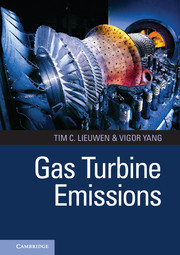Description
Gas Turbine Emissions
Cambridge Aerospace Series
Coordinators: Lieuwen Tim C., Yang Vigor
This book compiles the key scientific and technological knowledge associated with gas turbine emissions into a single authoritative source.
Language: English
Publication date: 07-2013
382 p. · 17.5x25.7 cm · Hardback
382 p. · 17.5x25.7 cm · Hardback
Description
/li>Contents
/li>Biography
/li>
The development of clean, sustainable energy systems is one of the pre-eminent issues of our time. Most projections indicate that combustion-based energy conversion systems will continue to be the predominant approach for the majority of our energy usage, and gas turbines will continue to be important combustion-based energy conversion devices for many decades to come, used for aircraft propulsion, ground-based power generation, and mechanical-drive applications. This book compiles the key scientific and technological knowledge associated with gas turbine emissions into a single authoritative source. The book has three sections: the first section reviews major issues with gas turbine combustion, including design approaches and constraints, within the context of emissions. The second section addresses fundamental issues associated with pollutant formation, modeling, and prediction. The third section features case studies from manufacturers and technology developers, emphasizing the system-level and practical issues that must be addressed in developing different types of gas turbines that emit pollutants at acceptable levels.
Foreword Alan H. Epstein; Part I. Overview and Key Issues: 1. Aero gas turbine combustion: metrics, constraints, and system interactions Randal G. McKinney and James B. Hoke; 2. Ground based gas turbine combustion: metrics, constraints, and system interactions Vince McDonell and Manfred Klein; 3. Overview of worldwide aircraft regulatory framework Willard Dodds; 4. Overview of worldwide ground-based regulatory framework Manfred Klein; Part II. Fundamentals and Modeling: Production and Control: 5. Particulate formation Meredith B. Colket, III; 6. Gaseous aerosol precursors Richard C. Miake-Lye; 7. NOx and CO formation and control Ponnuthurai Gokulakrishnan and Michael S. Klassen; 8. Emissions from oxyfueled or high exhaust gas recirculation turbines Alberto Amato, Jerry Seitzman and Tim Lieuwen; Part III. Case Studies and Specific Technologies: Pollutant Trends and Key Drivers: 9. Partially premixed and premixed aeroengine combustors Christoph Hassa; 10. Industrial combustors: conventional, non-premixed, and dry low emissions (DLN) Thomas Sattelmayer, Michael Koenig, Werner Krebs, Adnan Eroglu and Geoff Myers.
Tim Lieuwen is a Professor of Aerospace Engineering at the Georgia Institute of Technology. He has authored a research-based book, Unsteady Combustor Physics. He has published over 50 refereed journal articles, over 100 conference publications, eight book chapters and two edited books. Lieuwen is an expert on combustion, including such issues as emissions, efficiency and alternative fuels, and has worked with General Electric, Siemens, Exxon Mobil and others. He works on clean combustion technologies and alternative fuels with the Department of Energy, NASA and the Department of Defense. He holds six patents. Dr Lieuwen is an associate editor of the Journal of Propulsion and Power, Combustion Science and Technology, and the Proceedings of the Combustion Institute. He is a member of the Editorial Review Board of the AIAA Publication Committee and a recipient of the AIAA Lawrence Sperry Award. Dr Lieuwen is on the Propellants and Combustion Technical Committee and the Air Breathing Propulsion Technical Committee of the AIAA and the Combustion and Fuels Committee of the ASME.
Vigor Yang is the William R. T. Oakes Professor and Chair of the School of Aerospace Engineering at the Georgia Institute of Technology. He received his PhD from the California Institute of Technology. Prior to joining the faculty at the Georgia Institute of Technology, he was the John L. and Genevieve H. McCain Chair in Engineering at the Pennsylvania State University. His research interests include combustion instabilities in propulsion systems, chemically reacting flows in air-breathing and rocket engines, combustion of energetic materials, and high-pressure thermodynamics and transport. He has supervised more than 40 PhD and 15 MS theses. He is the author or co-author of more than 300 technical papers in the areas of propulsion and combustion, and has published 10 comprehensive volumes on rocket and air-breathing propulsion. He was the recipient of the Penn State Engineering Society Premie
Vigor Yang is the William R. T. Oakes Professor and Chair of the School of Aerospace Engineering at the Georgia Institute of Technology. He received his PhD from the California Institute of Technology. Prior to joining the faculty at the Georgia Institute of Technology, he was the John L. and Genevieve H. McCain Chair in Engineering at the Pennsylvania State University. His research interests include combustion instabilities in propulsion systems, chemically reacting flows in air-breathing and rocket engines, combustion of energetic materials, and high-pressure thermodynamics and transport. He has supervised more than 40 PhD and 15 MS theses. He is the author or co-author of more than 300 technical papers in the areas of propulsion and combustion, and has published 10 comprehensive volumes on rocket and air-breathing propulsion. He was the recipient of the Penn State Engineering Society Premie
© 2024 LAVOISIER S.A.S.
These books may interest you

Unsteady Combustor Physics 100.59 €



